This post is part of a series shedding some light on underreported or unusual topics in many African countries. Our first installment was about Madagascar. In this post, Gaelle Tjat, based in Douala, tells Global Voices about six must-know issues in her country, Cameroon. This post is republished and translated from her personal blog Amazing Tjat Bass with her permission.
1. Besides President Biya, who are Cameroon's most influential or famous personalities today?
Cameroonian citizens often ask themselves the same question. So if you happen to know the answer, please kindly enlighten us. But if there is something people should know, it is that the Cameroonian political system was designed in such a way that only one person can be in the spotlight at all time (see photo below).
In that context, it is quite a challenge to identify other influential figures. But in the long run, one can see that there are some potential “decision-makers” who are currently keeping a low profile. This is the best way to avoid being sent behind the bars by the ubiquitous “sparrowhawk”.
So let us talk about famous people rather than influential ones. For those like me born in the 1980s or later, footballer Samuel Eto’o, the most decorated African player of all time, is one of those hailed figures. DIPMAN, a Cameroonian communications and marketing agency, listed the top 10 Cameroonian personalities who are most influential on Twitter and three football players top the list.
Well, at least those mentioned in the list (pop celebrities notwithstanding) are succeeding in changing and transforming attitudes in Cameroon. They also provide hope for a better future despite all difficulties we face here.
2. Is there any actual tension between English speakers and French speakers in Cameroon or is it others who are making too big a deal out of this issue?
In my humble opinion, Anglophones and Francophones coexist peacefully all across the national territory as citizens of the same planet. The problem arises when we start thinking in terms of integration and national unity.
One issue of importance is that of the marginalisation of southern Cameroonians. Because of this situation, political parties such as the Southern Cameroon National Council (SCNC) have been strongly seeking more autonomy and pushing for secession (The Southwest region is mostly anglophone). So if one day, you feel like wandering through both the “Francophone” and “Anglophone” sides, you cannot help but notice the stark contrast between the two. You will see that the Anglophone side will show favorably when it comes to infrastructure and orderly behavior.
Unfortunately, nothing is done to unite this differences at the national level. We can even count on one hand the number of southerners who share a part of the country's “mangeoire” (wealth) [ed's note: for more on this, see Ladislas Nzessee definition of Mangeoire in his report on “Cameroonian French: Appropriation and Dialectisation,” page 121. It is ”an organisation of individuals who consider ‘national wealth” as their private propriety. Nzessee also speaks of accredited ethnicities.”] Perhaps it is about time to restore some balance in Cameroon when it comes to wealth distribution. This article and this one provide additional excellent insight on this issue.
3. In everyday life, do you speak English? French? Both?
Cameroon is a bilingual nation. However, its citizens are either Francophones or Anglophones, but rarely both. In that manner, we would be only copying the example of our head of state who delivered the opening address of the Commonwealth Conference in French.
The only time where bilingualism is brought into limelight is in the use of pidjin, which is a mix of French, English, Portuguese and Spanish. Pidjin came to be as a mode of communication during the slave trade along the coast of the country in order to facilitate transactions between traders and buyers.
Bilingualism is also used within the context of “camfranglais,” slang language created by Cameroonians.
4. What were the happiest times or greatest moments of pride in the country? And the saddest?
Many young Cameroonian activists are fighting to keep the memories of the country's forgotten heroes alive. So far, our proudest moments mostly include victories in sporting events. Most of those memories were created by the Cameroon National Football Team, aka the Lions Indomptables (the Indomitable Lions of Cameroon): their qualification to the quarterfinals of the 1990 FIFA World Cup in Italy; their back-to-back victory in the 2000 and 2002 African Cup of Nations; their triumph at the 2000 Olympic Summer Games in Sydney; their runner-up status at the 2003 FIFA Confederation Cup.
Aside from football, there were also Françoise Mbango's medals at the 2004 and 2008 Olympic Games. But these happy moments were short-lived as no further action was carried out to ensure the sustainability of these successful stories. So we are left with the nostalgic memory while hoping for the best at the Africa Cup of Nations (CAN) 2016 and 2019.
As for moments of great sadness, I recall the 1,700 people killed because of toxic gas released from Lake Nyos on August 21, 1986. I also felt so sorry for those 250 Cameroonian citizens who lost their lives on February 14, 1998 during the Nsam train explosion. There was also the tragedy of Cameroonian international footballer Marc Vivien Foé‘s sudden death in 2003 on the football field during the FIFA Confederation Cup.
5. What should the rest of the world know about Boko Haram in Cameroon ?
In the beginning, Boko Haram in Cameroon was composed of Nigerian rebels who would kidnap missionaries, Chinese people and young girls. Missionaries and Chinese people were set free after a likely hefty ransom payment. However, the girls are still held hostage somewhere in Nigeria.
On the other hand, the regime is carrying out a massive crackdown on those accused (rightfully or wrongly) of colluding with the enemy. These accusations result in arbitrary arrests and random raids of the homes of those alleged accomplices. So it is hard in these circumstances to try to get a clear picture of the issue here, even though Boko Haram is clearly a major problem in the region.
6. Why was Serena Williams wearing a Cameroon jersey while playing at the 2002 French Open?
During the finals of the 2002 French Open, the tennis champion was clad in a Cameroonian green, red and yellow outfit. Those Mr. Know-it-Alls out there, or ”sabitou-sabi-all’‘ as we call them in Cameroon, insinuated that she was involved romantically with some members of the football national team. The national media were gleefully buzzing about it all.
But the real reason behind Serena's outfit is a simple one: Back then in the early 2000s, Cameroon was indeed an Indomitable football team, just like Serena in tennis. They stood out from other football teams by wearing sleeveless jerseys (see photo) usually sported by tennis players.
Serena needed an outfit for the French tournament. So Puma, who was the sponsor for both the Cameroonian football team and Serena at the time, suggested that she wear their colors since she and the lions shared the same fighting spirit and she agreed.
Parceque les Lions Domptaient tout sur leur passage #LionSpirit RT@TjatBass: pourquoi Serena W. portait le vert-rouge-jaune à un moment?
— Cyprien TANKEU (@Cyprien_T) September 13, 2014
Because the Lions would tame everything in their way. #LionSpirit RT@TjatBass: Why did Serena W wear the green-red-yellow at one point?
I hope I have satisfied your curiosity and given you a taste of my homeland. I also hope that you will come visit to know more about my beautiful country, Cameroon.

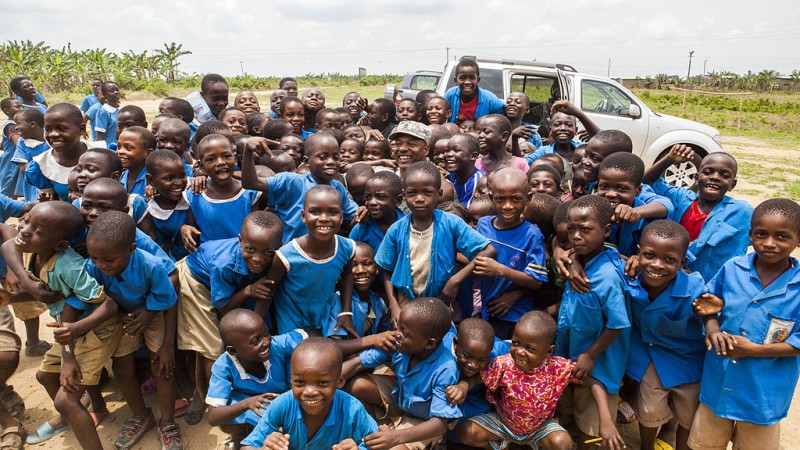

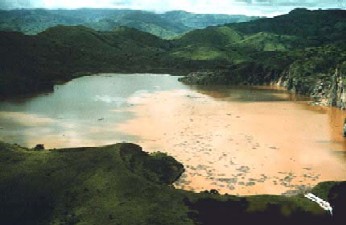
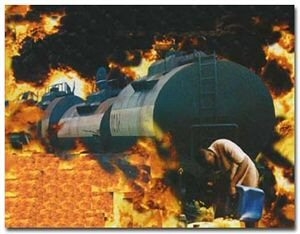
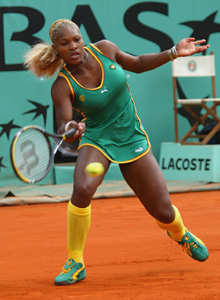
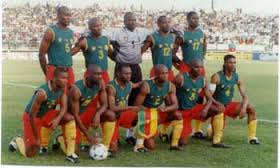






4 comments
Interesting article. Cameroon is bilingual only in West Cameroon and Francophone in the East.
This is beautiful. Thank you.
A clarification here about Serena Williams is, she traces her ancestry to Cameroon. This is a new “thing” most Black Americans do since they want to know where they came from during slavery. That reason you have up isn’t the correct justification. I have personally heard her interview about this. Thank u for this article. Quite educative. #Proudly237.